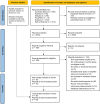Effects of immersion in a simulated natural environment on stress reduction and emotional arousal: A systematic review and meta-analysis
- PMID: 36698558
- PMCID: PMC9869155
- DOI: 10.3389/fpsyg.2022.1058177
Effects of immersion in a simulated natural environment on stress reduction and emotional arousal: A systematic review and meta-analysis
Abstract
Background: Although the mental health benefits of exposure to simulated natural environments are well established by researchers from environmental psychology, landscape architecture, and public health, it is unclear whether and to what extent technological immersion affects these benefits.
Methods: Systematical literature searches were conducted in May 2022 from six databases. The risk of bias was evaluated using the Cochrane's Risk of Bias tool 2.0 and the Risk of Bias in Non-randomized Studies of Interventions tool. We performed a random-effects meta-regression to investigate the heterogeneity. The immersion levels of included studies were classified by projection devices and motion capture, and then subgroup analysis was conducted.
Results: Twenty-six publications were included. Exposure to simulated nature was confirmed to be associated with increased positive affect 0.40 [95% confidence interval (CI): 0.22, 0.58], vigor 0.58 (95% CI: 0.30, 0.86), calmness 0.54 (95% CI: 0.17, 0.92) and decreased perceived stress -0.38 (95% CI: -0.71, -0.06), total mood disturbance -0.87 (95% CI: -1.17, -0.57), tension -0.70 (95% CI: -0.99, -0.41), fatigue -0.60 (95% CI: -0.91, -0.28), anxiety -0.72 (95% CI: -1.43, -0.02), depression -0.33 (95% CI: -0.52, -0.14), confusion -0.79 (95% CI: -1.19, -0.40), and anger -0.54 (95% CI: -0.76, -0.31). Gender, health status, study design, mean age, and single exposure duration were not significant when entered in a meta-regression. For positive affect, medium immersion was observed to produce a larger effect than low and high immersion. All included studies had a moderate to high risk of bias.
Conclusion: Audio-visual exposure to simulated nature contributes to stress relief and emotional arousal. The immersion level explains the heterogeneity of positive affect triggered by simulated nature. Focusing on the technical features will open up new possibilities for combining actual and simulated nature's mental health benefits.
Keywords: emotion; immersion; natural environment; restorative effect; stress; virtual reality.
Copyright © 2023 Li, Ding, Zhao, Xu and Wei.
Conflict of interest statement
The authors declare that the research was conducted in the absence of any commercial or financial relationships that could be construed as a potential conflict of interest.
Figures
Similar articles
-
The effect of short-term exposure to the natural environment on depressive mood: A systematic review and meta-analysis.Environ Res. 2019 Oct;177:108606. doi: 10.1016/j.envres.2019.108606. Epub 2019 Jul 24. Environ Res. 2019. PMID: 31362251
-
The future of Cochrane Neonatal.Early Hum Dev. 2020 Nov;150:105191. doi: 10.1016/j.earlhumdev.2020.105191. Epub 2020 Sep 12. Early Hum Dev. 2020. PMID: 33036834
-
An Actual Natural Setting Improves Mood Better Than Its Virtual Counterpart: A Meta-Analysis of Experimental Data.Front Psychol. 2020 Sep 30;11:2200. doi: 10.3389/fpsyg.2020.02200. eCollection 2020. Front Psychol. 2020. PMID: 33101104 Free PMC article.
-
Powered by virtual realities: promoting emotional recovery through technology-based recovery interventions.Ergonomics. 2021 Oct;64(10):1351-1366. doi: 10.1080/00140139.2021.1912399. Epub 2021 Apr 22. Ergonomics. 2021. PMID: 33836632
-
Household interventions for secondary prevention of domestic lead exposure in children.Cochrane Database Syst Rev. 2020 Oct 6;10(10):CD006047. doi: 10.1002/14651858.CD006047.pub6. Cochrane Database Syst Rev. 2020. PMID: 33022752 Free PMC article.
Cited by
-
Developing a Dyadic Immersive Virtual Environment Technology Intervention for Persons Living With Dementia and Their Caregivers: Multiphasic User-Centered Design Study.JMIR Aging. 2025 May 21;8:e66212. doi: 10.2196/66212. JMIR Aging. 2025. PMID: 40397932 Free PMC article.
-
How does the macroenvironment influence brain and behaviour-a review of current status and future perspectives.Mol Psychiatry. 2024 Oct;29(10):3268-3286. doi: 10.1038/s41380-024-02557-x. Epub 2024 Apr 24. Mol Psychiatry. 2024. PMID: 38658771 Free PMC article. Review.
-
Nature-based virtual reality relaxation to improve mental health and sleep in undergraduate students: A randomized controlled trial.Digit Health. 2025 Aug 10;11:20552076251365140. doi: 10.1177/20552076251365140. eCollection 2025 Jan-Dec. Digit Health. 2025. PMID: 40799837 Free PMC article.
-
The effects of digital nature and actual nature on stress reduction: A meta-analysis and systematic review.Internet Interv. 2024 Sep 15;38:100772. doi: 10.1016/j.invent.2024.100772. eCollection 2024 Dec. Internet Interv. 2024. PMID: 39329057 Free PMC article. Review.
-
Effects of simulated multi-sensory stimulation integration on physiological and psychological restoration in virtual urban green space environment.Front Psychol. 2024 Jun 20;15:1382143. doi: 10.3389/fpsyg.2024.1382143. eCollection 2024. Front Psychol. 2024. PMID: 38966742 Free PMC article.
References
-
- Alkahtani S., Eisa A., Kannas J., Shamlan G. (2019). Effect of acute high-intensity interval cycling while viewing a virtual natural scene on mood and eating behavior in men: a randomized pilot trial. Clin. Nutr. Exp. 28, 92–101. doi: 10.1016/j.yclnex.2019.10.003 - DOI
-
- Appleton J. (1996). The experience of landscape. London, UK: Wiley Chichester.
-
- Bauduceau N., Berry P., Cecchi C., Elmqvist T., Fernandez M., Hartig T., et al. . (2015). Towards an EU research and innovation policy agenda for nature-based solutions & re-naturing cities: Final report of the horizon 2020 expert group on “Nature-based solutions and re-naturing cities” (full version). Bruxelles, Belgium: Publications Office of the European Union.
Publication types
LinkOut - more resources
Full Text Sources





